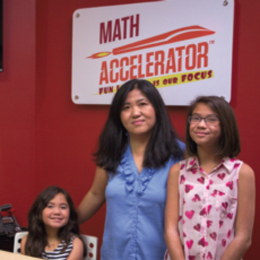
When a student struggles with math, finding the right tutor can become tricky—especially when parents want a tutor who helps build a child’s confidence. Enter: Kit Wong’s Math Accelerator program, whose specialized system differs from your run-of-the-mill tutoring setup of a desk, chair and notes.
“I’m not your traditional tutoring [program], where the instructor is meeting with the student behind a desk,” says Wong, the owner and lead instructor of Math Accelerator since 2013 with over 25 years tutoring experience. “My program is more of an enrichment program. It’s all interactive and hands-on instead of teaching [students] to memorize formulas. I teach them the logic behind the math.
“A lot of students count on their fingers and my way of teaching them how to stop is I teach the logic for what they already know [and how to apply it]. Within the first class, all the kids will stop counting fingers,” says Wong.
This specialized system allows students to learn in a group setting and by playing games. “It’s always interactive in the classroom, kids are always participating and they work as a team sometimes,” she says. “The games I set up help them brainstorm and think outside the box.”
Each classroom features dry-erase boards where students can work together solving problems or teaching others how to complete one. “My program also teaches beyond math,” adds Wong. “[It] teaches them to build self-confidence, teamwork and also communication. After mastering a topic, sometimes students switch roles with the instructor to demonstrate their problem-solving skills to the class. It’s a great way to see how well they understand the lessons, improve self-confidence and public speaking skills.”
While some parents may be concerned that a group setting—whose maximum is 14 children per class—would hinder the one-on- one attention a child would receive otherwise, Wong explains her games allow her to identify problem areas. “[Students] practice playing the games by teaming up or going against each other, and I can see their interaction and identify the issues of each student and what they need to work on.”
In terms of addressing those issues, Wong establishes recaps that work twofold: it helps the student and acts as a review for the rest of the group. “We don’t pull kids out so they feel like they're on the spot,” she assures. “It’s all about building their self-confidence so we help the [student] and guide them, that way the other kids get a refresher of what they learned to make sure they totally understand the material as well.”
One-on-one tutoring is, of course, available if parents feel their child would benefit more. “They can put a request in but I normally ask parents to let their child do the class before jumping into one-on-one so quickly,” advises Wong. “I’ve been running the program for three years and lots of [students] went from having trouble to doing really well without jumping into the one-on-one because the group setting is easier for them to ease into and it’s comfortable.”
As far as assessment goes, Wong explains each student is placed in a class depending on their grade level and ability. “[With] the kids who are struggling, you don’t want to put them behind by pushing them back, it’s important to rebuild their foundation so I will advise to put them in two classes,” says Wong. “We can make sure they stay on top of what they're doing at school and at the same time rebuild their foundation with the lower grade classes until they pick it up.”
Math Accelerator also offers additional programs including back-to-school and after-school programs and summer classes like the Junior Entrepreneur program, which applies math to real world scenarios or the Mathscape room. “It’s similar [to an escape room] but instead of finding the key, they have to find the combination of getting out of the room,” says Wong. “It involves mathematics and it’s kind of my final exam for students. I take what they learned from the class because I teach a lot of techniques and tricks, so they learn how to apply it.”
For parents deciphering whether or not their child needs special attention in a certain subject, Wong says to be cognizant of a child’s fluctuating grades in a subject matter—especially if they perform well in school overall. “That is an indication that the child might have anxiety, and parents should also be open with communication instead of focusing on the grade because it increases anxiety. ... It really allows you to be prepared and see what's going on.” “Everything in life involves math,” adds Wong. “My business not only teaches them mathematics, but how to think outside the box early on instead of when they graduate college and say, ‘What do I do now?’ It’s never too early to learn mathematics.”
Math Accelerators
300 Chester Ave.
Moorestown
(856) 242-9128
MathAccelerator.us
Published (and copyrighted) in Suburban Family Magazine, Volume 7, Issue 5 (July, 2016).
For more info on Suburban Family Magazine, click here.
For information about advertising in Suburban Family Magazine, click here.
To find out where to pick up your copy of Suburban Family Magazine, click




